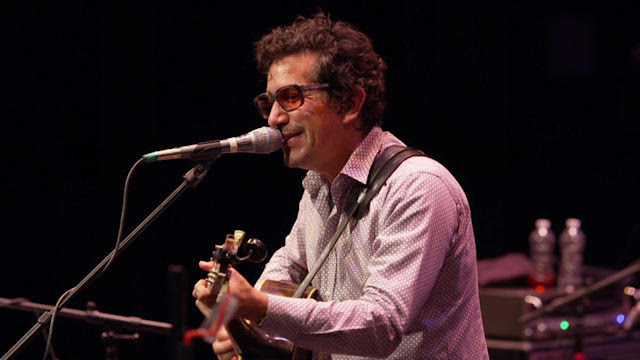A.J. Croce on reconnecting with his father, Jim Croce
A.J. Croce talks about getting back in touch with his dad, Jim Croce
The singer's life is a list of losses, like a blues song. A.J. Croce lost his father before he turned two, his sight when he was four, his home to a fire, and his wife to a rare heart condition. He said, "Man, I'll tell you, it's been a wild ride."
"We can choose how to deal with losing someone we love, whether it was my father, my wife, or my sight. Do we want to think about it a lot? Do we want to take what was best about that person or that experience with us?"
He has thought about this question for decades. Now that he is 50, he has an answer that he is sharing on stages all over the country: Croce, like Jim Croce, a singer, songwriter, and balladeer who was popular in the early 1970s and had hits like "Photographs and Memories," "I Have to Say I Love You in a Song," and "Bad, Bad Leroy Brown":
In July of 1973, "Bad, Bad Leroy Brown" was at the top of the charts. Two months later, Croce died in a plane crash after a concert in Natchitoches, Louisiana.Jim Axelrod, a reporter, asked, "Do you remember your dad at all?"
"You know, I remember how warm your embrace felt, you know?" A.J. answered. "And even though I can't see it, I can feel it.""Yet strong?""Very, very."
Nowhere was this more powerful than at a farm outside of Philadelphia, where A.J. lived with his parents as his father's career took off and where album covers were often based on farm buildings. Taking Axelrod to see the building that was on "You Don't Mess With Jim," A.J. said, "It was made for pigs at first. Then it was chickens' turn!"
Jim Croce's biggest hits, like "You Don't Mess Around With Jim," "New York's Not My Home," "Operator," "Bad, Bad Leroy Brown," and "Rapid Roy (The Stock Car Boy)," were written in the farmhouse.
But on that September night in 1973, he also lost the sense of safety that his father's success seemed to give him. A.J. said, "It was a very violent and dark time in my life, and it was very scary."
After his father died, his mother, Ingrid, started dating a man who beat A.J. so badly that he went blind. "During that time, I sat at the piano and played along with whatever was on my little transistor radio, whether it was ELO, McCartney, the Stones, or Elton John."
Only one man's music was off-limits to him. He said, "When I was a teenager, it was sometimes hard to get out from under the shadow of my father. Since I was 16 or 17, people asked me to record my father's music, but I wasn't interested."
Over the next 35 years, he would get back some of his sight, play the piano with artists like Ray Charles and Willie Nelson, and build a name for himself as a songwriter. If he couldn't completely get away from his father's shadow, he found a way to live next to it.
Axelrod asked, "Did you feel free when you had your own success on your own terms?"
And you didn't have anything to prove to anyone, so maybe it was a little easier to accept your father's stuff?"It went much smoother."That's how this singer finally got to this stage, where Croce now plays Croce.
A.J. said, "Then I realised that he was a part of my life and that I was a part of his legacy." "And I thought it was important to accept it at a certain age and level of maturity."Wasn't it time?Yeah. Simple.
Now, almost 50 years later, A.J. Croce is looking into his relationship with a father he hardly knew. He said, "Most people have a picture, if they're lucky. I'm happy that there's a lot more than that."And so do his audiences. Almost everyone who likes Jim Croce's music has a favourite song by him. A.J. is the same, but his reasons are different.Axelrod asked, "When you play and sing your dad's songs on stage, is there one that means more to you than the others?"
"Yeah. "Time in a Bottle" does, for sure. It makes me feel so sad."
Why? "Well, you know, because it was written for me, and it shows how he felt about my mother and me."A.J. said, "I feel a lot of different things." "I feel happiness and a sense of care."Axelrod said, "I'm sure you'll be dealing with this loss for the rest of your life."We all do. Yeah.Does listening to his music help you get over his death?A.J. said, "If it's not the cure, it's a great fix."



Comments
Post a Comment